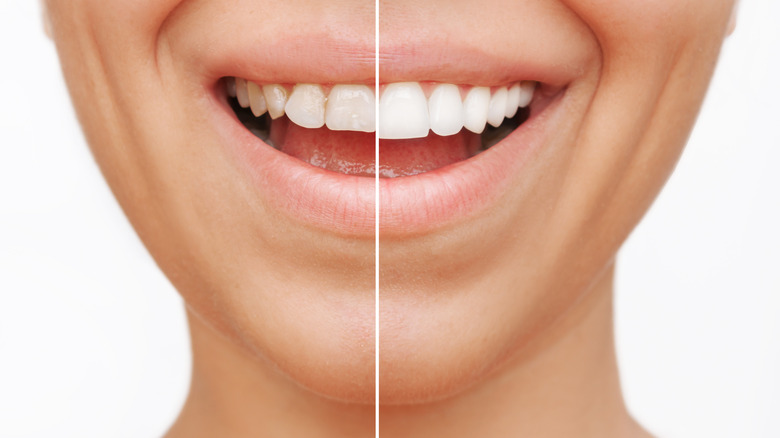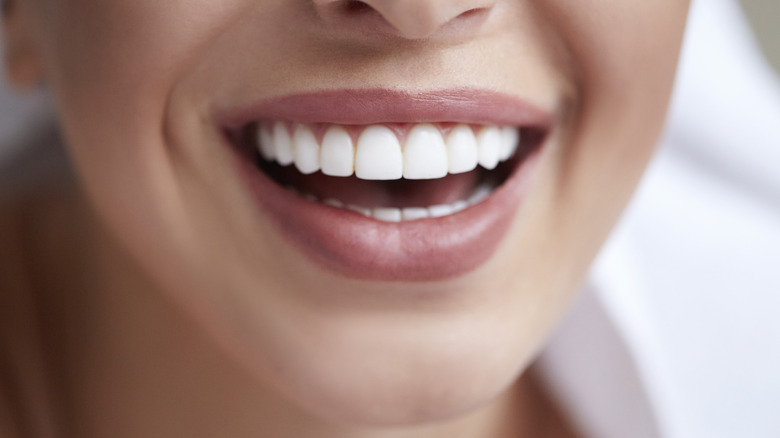Should You Replace Your Veneers? How To Know When It's Time To Update Your Smile
What do Miley Cyrus, Cardi B, and Hilary Duff have in common? Apart from having banger after banger, they also have picture-perfect teeth, and it's all thanks to veneers.
To the uninitiated, veneers are thin shells, usually made out of porcelain or composite, that are attached to your real teeth to make them look aligned. More and more celebrities and influencers are getting them, which is why you may have already noticed that many of them have flawless smiles. "It's almost hard to find an influencer without veneers now," Dr. Michael Apa, an aesthetic dentist, told The Atlantic. "It just completely changed the landscape of how I thought of attracting business and patients." But apart from being something of a status symbol, they also help in boosting people's confidence, since the enhancements improve one's overall appearance. "I often call it the ultimate face lift — people are surprised at how much younger it makes them look," cosmetic dentist Dr. Sharon Huang shared with Real Simple.
It should be noted, however, that veneers are a big commitment. In most cases, dentists have to shave down a few millimeters of your teeth's enamel, and that's something that can no longer be reversed. This is because your real chompers have to be aligned in order for the veneers to sit and be bonded on them properly. Plus, veneers are not permanent and require replacements every few decades or so. Professionals say they can last up to 10 to 20 years, especially the porcelain variant, but it all depends on how you care for them.
Veneers need to be replaced when there's chipping and extreme discoloration
What you need to understand about veneers is that just like actual teeth, they go through normal wear and tear. That means they can chip, crack, change color, and even separate from the gums. The Dental Boutique notes that when these happen — which they likely will years down the line — a replacement will be needed. What's more, there are even cases where the veneers become loose, causing the teeth underneath to rot, making a replacement an immediate necessity.
When it comes to replacing veneers, Dr. Michael Apa told The Zoe Report that you would need to undergo the same process you had the first time you had veneers installed. It doesn't make sense to replace veneers of only one tooth or two. "We recommend replacing all existing restorations at the same time, and sometimes we need to restore additional teeth because we're accounting for facial change, like loss of collagen in the cheeks," he explained, adding that the priority is to "preserve as much of the natural tooth structure underneath as possible." However, if it's found that a tooth is decaying underneath or your gum line has shifted, more prep work for the tooth will be performed.
Veneers should be taken care of like real teeth
Depending on when you get them or how you take care of them, you can expect to have your veneers replaced every two decades. But in order to get your money's worth (veneers can cost up to $6000 per tooth), you need to maximize their longevity.
Because veneers are designed to look and function like real teeth, you need to take care of them like real teeth as well. That means you should maintain superior dental hygiene, including regular brushing, flossing, and routine dental visits. And while veneers are not fragile, you should also be careful about the foods you eat to minimize your risks of damaging them. "Overall, you should take care not to eat foods which are hard, crunchy, sticky, too cold or too hot," dentist Dr. Kartik Antani told Parade. "With veneers, this care should be continued. Most normal foods are fine to eat, but don't abuse your teeth."
Cosmetic dentist Dr. Marc Lowenberg also advised against using your teeth for chewing or biting non-edible material. "Whether you're doing bonding or porcelain veneers, you cannot use your teeth for anything other than chewing," he shared with Byrdie. "What I'm saying is, you can't open up bottles with your teeth, or bite your fingernails, or do anything that will easily crack the bonding, because it will crack."


